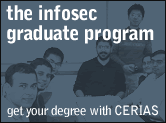Posts tagged acm
Page Content
Solving the Wrong Problems
E-voting rears its head. Again.
Over the last few years, I have been involved in issues related to the use of computerization in voting. This has come about because of my concerns about computer security, privacy and reliability, and from my role as chair of the ACM U.S. Public Policy Committee (USACM). USACM has taken a strong position as regards use of computers as voting stations and voting over the internet.
Two recent items address the issue of voting over the Internet.
The first is a study released by NIST about the threats posed by internet voting. This is a well-written document describing problems that would be encountered with any online voting system. Their conclusion is that, for public elections, distribution of blank ballots (on paper) is the only reasonable improvement that we can make with current technology.
The second is a note from my colleague, Yvo Desmedt, one of the senior leaders in information security He has asked that I circulate this to a wider audience:
IACR (the International Association for Cryptologic Research) has changed its bylaws to allow e-voting over the internet to elect its board members and other purposes. IACR will likely move towards internet e-voting. The IACR Board of Directors subcommittee on internet e-voting has published a list of requirements for such a system at: http://www.iacr.org/elections/eVoting/requirements.html This is evidently a first step and the question remains whether the system the International Association for Cryptologic Research will choose will be easy to hack or not. So, security experts should follow this development.
The problems that need to be addressed by any voting technology are mostly obvious: impersonation of the voter, impersonation of the voting system, disclosure of the ballot, multiple voting, loss of votes, denial of access, and a number of other issues. The problems are complicated by the requirements of a fair voting system, one of which is that of vote deniability—that the voter is able to deny (or claim) that her/his vote was cast a particular way. This is important to prevent vote buying, or more importantly, retribution against voters who do not cast ballots in a particular way. It isn’t difficult to find stories where voters have been beaten or killed because of how they voted (or were presumed to have intended to vote). Thus, the tried-and-true concept of providing a receipt (ala ATM machines) is not a workable solution.
My intent in making this post isn’t to discuss all the issues behind e-voting—that is well beyond the scope of a single posting, and is covered well many other places. My main goal is to give some wider circulation to Yvo’s statement. However, in light of the recent problem with certificate issuance, it is also worth noting that schemes requiring encryption to secure voting may have hidden vulnerabilities that could lead to compromise and/or failures in the future.
In the end, it comes down to a tradeoff of risk/reward (as do all security choices): can we accurately quantify the risks with a particular approach, and are we willing to assume them? Do we have appropriate mechanisms to eliminate, mitigate or shift the risks? Are we willing to accept the risks associated with adopting a particular form of e-voting in return for the potential benefit of better access for remote voters? Or are accurate (fair) results all the time more important than complete results?
Note that one objection often raised to USACM as we argue these points is “There is no evidence there has ever been a failure or tampering with a vote.” In addition to being incorrect (there are numerous cases of computer-based voting failures), this misses two key issues:
- How do you tell if there is tampering if there are no safeguards that definitively disclose such tampering? That you have not detected something does not mean it has not occurred.
- The past does not predict the future in such a case. That no failure (accidental or otherwise) has occurred does not mean it will not occur in the future. Worse, a string of occurrences without a failure may help cloud a future discovered discrepancy!
In the case of IACR, it is obvious why this group of cryptography professionals would wish to adopt techniques that show confidence in cryptography. However, the example they set could be very damaging for other groups—and populations—if their confidence is misplaced. Given the long history of spectacular failures in cryptography—often going unannounced while being exploited—it is somewhat surprising that the IACR is not more explicit in their statement about the risks of technological failures.

